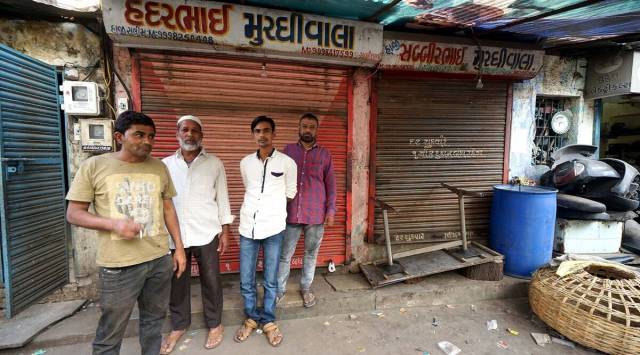HC joins meat vendors as parties in PIL on illegal slaughterhouses
Government pleader Manisha Lavkumar Shah acknowledged before the bench of Chief Justice Sonia Gokani and Justice Sandeep Bhatt the need for a comprehensive checklist in the state such that if the "requirements are met with, there should be no difficulty in operating (for the meat vendors)".
 Vendors in front of a mutton shop closed in Vadodara during a drive by the municipal corporation. (Express photo by Bhupendra Rana
Vendors in front of a mutton shop closed in Vadodara during a drive by the municipal corporation. (Express photo by Bhupendra Rana
Emphasising the need for a comprehensive checklist in operating meat shops, a division bench of the Gujarat High Court Thursday joined meat sellers and their associations as parties to an ongoing public interest litigation seeking a ban on illegal and unlicensed slaughterhouses and meat shops. The bench also proposed that a meeting be held of the state authorities along with representatives of the affected meat sellers.
Government pleader Manisha Lavkumar Shah acknowledged before the bench of Chief Justice Sonia Gokani and Justice Sandeep Bhatt the need for a comprehensive checklist in the state such that if the “requirements are met with, there should be no difficulty in operating (for the meat vendors)”.
Agreeing to the proposition, CJ Gokani added, “You need to come out with a checklist and it will have to be concise where people can know what they need to follow…So, let all the legal businesses continue but for them to know what is the illegality, you shall have to tell them.”
In response, Shah proposed a meeting be convened between the vendors and the government representatives from the departments of health, urban development, home, animal husbandry and also from the Gujarat Pollution Control Board (GPCB) so that all stakeholders are on the same page as to where exactly the problem lies and how they are proposing to deal with it.
The court directed that meetings be held district-wise but “the agenda, material and points of discussion shall be prepared centrally (by the state government)”, under the guidance of the office of the government pleader.
The court has instructed that the agenda of the proposed meetings be placed before the court by February 24 and once finalised and agreed upon by the parties, district-wise meetings can be held in the week thereafter.
Espousing the cause of 21 meat shop owners whose shops have been either sealed or closed despite possessing valid licences, senior advocate Percy Kavina had submitted before the court that “stamped meat is a utopian idea”. While the law and the Supreme Court directions provide for stamping of meat, “the court must accept what the reality is”, he stated.
The provision of selling stamped meat requires approval by authorised slaughterhouses to approve the meat quality. Currently, Gujarat has eight authorised slaughterhouses, according to the state government. However, of these, only three are operational, according to the petitioners.
Advocate Ejaz Kureshi, who was also representing the affected meat sellers, had submitted that the state has also failed in discharging its duties that require it to construct slaughterhouses and dedicated meat markets to regularise the vendors’ businesses. According to Qureshi, meat vendors have been making repeated representations to the state government regarding the same but the requests have gone unheard so far.
Following earlier directions of the HC in the PIL, eight municipal corporations in the state have either sealed or closed over 800 meat shops that are unlicensed or are selling unstamped meat or are selling meat in unhygienic conditions.
These include 51 and 578 shops closed in the Junagadh Municipal Corporation and Surat Municipal Corporation areas. Additionally, as submitted by the state’s animal husbandry department in an affidavit dated February 16, 156 district-level slaughterhouse committees across the state have sealed 188 meat shops without licence, 137 meat shops for selling unstamped meat and 124 meat shops selling in unhygienic conditions. Another 1,004 shops have been closed for operating without a licence, 861 for selling unstamped meat and 800 for selling unhygienic meat.







